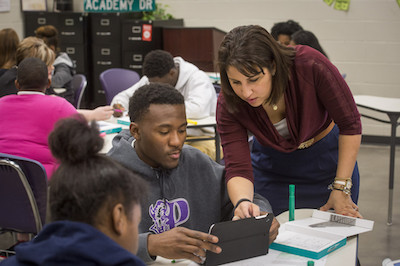Writing skills are essential as students move from high school to college and beyond. Keeping students interested, however, is not always easy. A new University of Alabama at Birmingham pilot program is using technology to help capture students’ attention while improving their writing skills.
The UAB Innovative Learning Collaborative is a partnership between the UAB School of Education and Birmingham City Schools that is working to form a learning community that improves education and benefits students and faculty.
The ILC, which began with programs in Glen Iris Elementary and EPIC Alternative Elementary, expanded to A.H. Parker High School through a pilot program to improve writing skills.
UAB education students and teachers from the ILC and Red Mountain Writing Project are working with 50 students from Parker High’s Academy of Urban Educators to better engage them in the learning process and improve their writing skills. One key area tested by the program is the use of tablet computers preloaded with reading and writing tools.
“Technology can help students with engagement and motivation,” said Tonya Perry, Ph.D., associate professor in the Department of Curriculum and Instruction and director of the UAB Center for Urban Education. “Today’s high-school students are 21st century digital natives. They understand technology and how it works. I think it is something that excites them and can help ignite a passion for learning.”
The pilot program was made possible by a gift from AT&T Alabama.
“Education has been AT&T’s philanthropic focus for many years,” said Fred McCallum, president of AT&T Alabama and member of the UAB School of Education advisory board.
“Through 2017, we’ve committed to invest about $350 million in our schools and universities such as UAB to research ways we can help increase high-school graduation rates, find innovative ways to assist with learning, and ensure that students graduate either college- or career-ready.”
 Perry and her students gathered initial writing samples to benchmark the participants’ progress throughout the school year. Perry’s students taught essay-organization techniques with pencils and paper before introducing tablets into the sessions.
Perry and her students gathered initial writing samples to benchmark the participants’ progress throughout the school year. Perry’s students taught essay-organization techniques with pencils and paper before introducing tablets into the sessions.
“It’s so nice to have these students working with technology to foster learning,” said Jenise Gorman, Perry’s graduate assistant for the pilot. “I want these lessons to translate to all of their classes because these are tools they can use for everything.”
The pilot also gives Perry’s students more time in classrooms, broadening their teaching experiences and expanding their arsenal of teaching tools.
“I think it’s important that UAB students learn how to work in a variety of communities, and working in the urban community is very important,” Perry said. “They’re learning how to increase their literacy skills in the teaching of our students. It’s not always easy. You may know how to write and how to read, but being able to explain that skill and craft to someone else is not always as easy as you would think. Being able to break down the material so other people can gain that skill and learn that craft is very important.”
During the second phase of the pilot, Parker teachers will receive training on the writing tools and technology. Perry hopes that by passing techniques for coaching writers on to teachers, the pilot will become a sustainable program.
“Our goal is PLAN 2020 [the Alabama State Department of Education strategic plan to prepare all students to be successful upon graduation from high school], to be college- and career-ready,” said Melody Hope Wilson, cooperative education coordinator of the Academy of Urban Educators. “As far as college is concerned, the students really need to have technology skills. They’ll also need to be prepared for the job market and careers. Technology is a huge part of that.”
If successful, the pilot program could expand to additional Parker students and other Birmingham-area schools to improve the rates of college-readiness across Alabama.
“Having this community partnership enables us to connect in a proactive and strategic way to combine resources and have more of an impact,” Perry said. “We can take the resources that AT&T has sponsored, combined with those families and schools will have available and with UAB’s resources, to create what I think will be a world-class project.”
This pilot is one of myriad ways the School of Education is changing education in Alabama.
“This program gives us an exciting opportunity to have our UAB students and faculty engaged and enmeshed in our local schools, working with those teachers to foster student success,” said Dean Deborah L. Voltz, Ed.D. “AT&T’s philanthropic investment enables us to develop and contribute an education model we think will bring additional positive change to Alabama schools.”